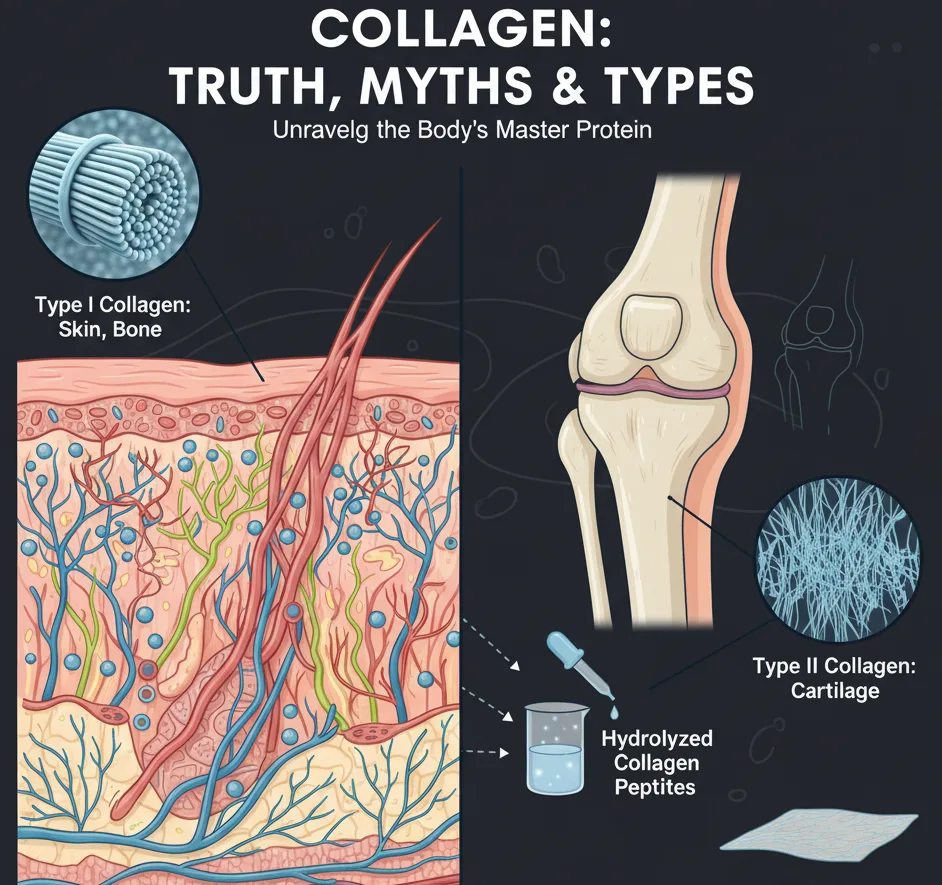Collagen, the most abundant protein in our bodies, is often hailed as the fountain of youth, particularly in the realm of skincare and joint health. But with a surge in supplements and beauty products, it's easy to get lost in the hype. Let's separate fact from fiction, explore the different types of collagen, and understand what each is good for.
The Truth About Collagen: What Does Science Say?
The image you provided, showcasing "Results" from "Human studies" on collagen supplements, highlights several key findings:
-
Improved Skin Hydration and Elasticity: Studies suggest that collagen supplements can indeed lead to "significant improvement in skin hydration and dermis density" and "earlier elasticity among elderly women." This aligns with collagen's role in maintaining skin structure and moisture.
-
Reduced Wrinkling and Roughness: The results indicate "decrease in skin wrinkling and roughness with higher content collagen peptides." This is likely due to the enhanced skin hydration and improved dermal structure.
-
Dermal Collagen Network: There's evidence of "significant decrease in dermal collagen network fragmentation," meaning the collagen fibers in the skin become more organized and less broken down. This is crucial for maintaining skin's integrity.
-
Post-Surgery Benefits: The mention of "improvement in skin elasticity in participant who underwent cosmetic surgeries" suggests potential benefits for recovery and skin quality in specific contexts.
These findings primarily relate to hydrolyzed collagen or collagen peptides, which are broken-down forms of collagen that are easier for the body to absorb.
The Myth: "Collagen Isn't Absorbed"
The user's question in the image, "Why do they say mostly that it's not absorbed and is mostly a business?", touches on a common misconception. While it's true that whole collagen molecules are too large to be directly absorbed into the bloodstream, modern collagen supplements typically use hydrolyzed collagen or collagen peptides.
When collagen is hydrolyzed, it's broken down into smaller amino acid chains. These peptides can be absorbed in the digestive tract. Once absorbed, they travel through the bloodstream to various tissues, including the skin, joints, and bones. Here, they act as building blocks, signaling the body to produce its own collagen and other vital proteins like elastin and hyaluronic acid. So, while you're not directly ingesting and absorbing intact collagen fibers, you are providing your body with the necessary components and signals to boost its own collagen synthesis.
How Many Collagen Types Do We Have?
There are at least 28 different types of collagen identified in the human body, each with a unique structure and function. However, a few types are far more prevalent and important to understand in the context of supplements and health:
-
Type I: This is the most abundant type, making up about 90% of the body's collagen. It's found in skin, bones, tendons, fibrous cartilage, connective tissue, and teeth. It provides tensile strength and elasticity.
-
Type II: Found primarily in elastic cartilage, which cushions joints. This type is crucial for joint health and flexibility.
-
Type III: Often found alongside Type I, particularly in the skin, muscles, and blood vessels. It provides structure to hollow organs and is important for skin elasticity and wound healing.
-
Type IV: Forms the basal lamina, a thin layer that surrounds cells and is crucial for filtration in organs like the kidneys and in the skin.
-
Type V: Present in hair, the surface of cells, and the placenta. It helps regulate the formation of collagen fibers from Types I and III.
-
Type X: Found in articular cartilage and involved in bone formation and endochondral ossification (the process by which cartilage is replaced by bone).
Which Type Is Good for What?
When choosing a collagen supplement, understanding the common types can help you target specific health goals:
-
For Skin, Hair, and Nails (and Bones/Tendons): Focus on supplements rich in Type I and Type III collagen. These are often sourced from bovine (cow) or marine (fish) collagen.
-
Bovine Collagen: Primarily Type I and Type III. Good for skin elasticity, hydration, hair, nails, bones, and muscles.
-
Marine Collagen: Primarily Type I. Known for superior bioavailability (absorption) and often favored for skin benefits.
-
Here's an illustration showing common sources of collagen:
-
-
For Joint Health and Cartilage Support: Look for supplements containing Type II collagen. This is typically sourced from chicken sternum.
-
Chicken Collagen: Primarily Type II. Best for joint comfort, reducing joint pain, and supporting cartilage.
-
-
"Multi-Collagen" Blends: Many supplements combine several types (I, II, III, V, X) from various sources to offer comprehensive benefits for skin, hair, nails, joints, and gut health.
The Business of Collagen: Is It Just Hype?
While there's a definite "business" aspect to the collagen market, the scientific evidence, as shown in your initial image, indicates that these supplements are not purely snake oil. For many individuals, especially as we age and natural collagen production declines, supplementing with hydrolyzed collagen can offer tangible benefits. However, like all supplements, individual results can vary, and it's important to choose high-quality products from reputable brands.
In conclusion, collagen supplements, particularly hydrolyzed forms, offer a promising avenue for supporting skin health, joint function, and overall well-being. By understanding the different types and their specific roles, consumers can make more informed choices tailored to their individual needs.

